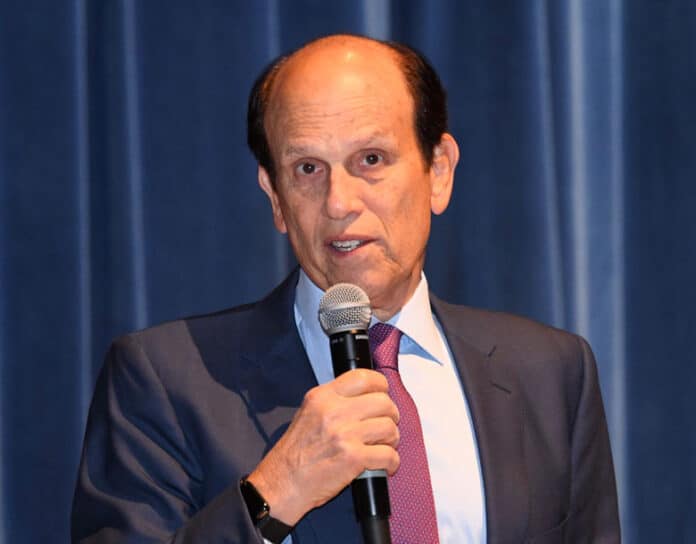Beneath the grand chandeliers of the International Ballroom at the Beverly Hilton Hotel, at rooftop bars and at private parties at billionaires’ mansions, there was a mix of emotions among the financial titans gathered in Los Angeles last week.
Many of the thousands of attendees at the Milken Institute Global Conference — a who’s who of finance and corporate America — remained anxious amid volatile markets, continuing trade tensions and deep cuts to the federal government.
“I’m a CEO, I talk to a lot of CEOs, and there is nervousness there,” Kamal Bhatia, president and CEO of Principal Asset Management, said while he sat on the same stage that hosts the Golden Globes.
But there was also a palpable sense of growing optimism after a rocky three-month start to President Donald Trump’s second term: “I’m optimistic about technology, I’m optimistic about the direction of the economy, I’m optimistic about cutting costs,” said Tony Minella, cofounder and president of Eldridge Industries, an asset management firm. “I think there is a lot of excitement in the world right now, and it’s a fantastic time to live.”
The mood at the annual West Coast confab echoed the mood in financial markets.
After Trump’s unexpectedly high tariffs sent stocks tumbling, there has been some relief from the initial panic as the administration has offered concessions and promoted deal talks that it says will lower tariffs.
The S&P 500 dropped almost 20% below its peak in February, but it has since rebounded, recovering roughly two-thirds of its losses.
But despite the recovery, uncertainty remains. Skeptics on the sidelines of the conference suggested that some fund managers were simply painting a rosier outlook to avoid spooking the investors in their funds. Others described it as more hope than conviction.
“Nobody, myself included, can say how this is going to end,” said Ron O’Hanley, chairman and CEO of State Street. “There may be wishful thinking in all that.”
Scott Bessent, the Treasury secretary, set the tone May 5, as he tried to soothe the financiers’ concerns. He had started his mission the night before, hosting a private dinner for a handful of investors, according to some of the attendees.
Many in the audience May 5 were left hopeful that tariffs would ease as trade deals were made, buffeted by more pro-growth, pro-business policies like tax cuts and deregulation to come later in the year. But there was also an awareness that the reality may still look very different. Business is on hold, corporate deal making is dormant, and the longer that continues, the worse the consequences could be.
With that doubt, many speakers at the conference noted that they were looking more closely at investing in Europe and other parts of the world, diversifying away from the United States’ uncertain future.
Pension funds, university endowments and insurance companies, which have been heavily invested in the United States in recent years, are beginning the slow process of reassessing where they put their money going forward.
Kim Lew, president of the Columbia Investment Management Company, the endowment for Columbia University, noted that while there was good reason so many fund managers became heavily exposed to the U.S. economy, “I think we all wish we had invested in the world more globally.”
Investors souring on U.S. markets fed into another widely discussed concern: the role of the dollar as the world’s reserve currency, and its importance in supporting the government’s $36 trillion of debt.
The corollary of trade deficits is when international investors hold more dollars that have been reinvested in U.S. assets like the government’s debt. If investors begin to back away, either because of tariffs or geopolitics or declining confidence in the stability of the dollar, then the government’s ability to continue financing its debt could be called into question.
“I believe the underlying foundation of the dollar and the Treasury market has been eroding over the last number of years, and we better pay attention to it soon,” said Alan Schwartz, executive chairman of Guggenheim Partners.
Late afternoon May 6, Michael Milken took the stage for a rare keynote speech. Since the conference began in 1998, he has given just two speeches — in 2000 and 2017.
Milken is widely credited as the father of the high-yield bond market, having devised a way in the 1980s to lend to risky companies that banks and other financial institutions had typically shunned.
In 1990, he pleaded guilty to securities fraud and conspiracy. He served just under two years of a 10-year prison sentence and was barred from the securities industry for life. He was pardoned by Trump in 2020.
In his keynote speech, Milken made a case for the American dream and the importance of economic freedom, equality of opportunity, public health and broad access to education.
“One of the things that has differentiated America from almost every other country in the world is that you have a chance to try, and if you fail, you have a chance to try again,” he said. He added that “quite often, people in our own country have forgotten how lives are changed by freedom.”
Immigration — nor the aggressive detention and deportations that are upending immigrant communities in cities like Los Angeles — was not a big focus of the official discussions at the Milken Institute gathering.
But Milken chose to conclude his own remarks by celebrating immigrants and referring to the words in President Ronald Reagan’s final speech from the White House in 1989.
“When people think about this speech, they often think about it as an ode to our immigrants in this country and how they have come to this country for the hope of a better life, and they renew each of our focus on the importance of freedom,” Milken said. “And they make significant contributions to us.”
c.2025 The New York Times Company. This article originally appeared in The New York Times.







